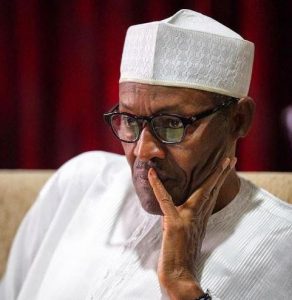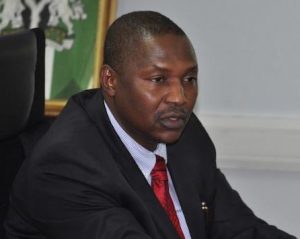
August 19, 2019. Voice of Nigeria: The Central Bank of Nigeria, CBN, says President Muhammadu Buhari’s directive that foreign exchange should no longer be approved for the importation of food in Nigeria is in line with the bank’s policies.
President Buhari had last week directed the apex bank to stop the issuance of foreign exchange for the importation of food into Nigeria.
The CBN Governor, Mr. Godwin Emefiele, who spoke to State House correspondents on the side-lines of the Presidential Retreat for ministers designate, federal permanent secretaries and top government functionaries, said “the directive is in the logic of CBN’s management foreign exchange policies that we started since 2016.”
Emefiele said that the CBN started the policy with about 41 items (food and non-food items) because those items could be produced in the country.
“As we stand today, there are about 43 items on that list and I will say substantially most of them are food items.
“We are basically saying, if we have a food item that can be produced in the country, why should we waste scarce foreign exchange importing those items into the country, when those can be produced in the country.
“It is important for me to say that the attempt to misrepresent the comments of Mr. President is very unfair and unfortunate.
“But what we will say from the CBN is that the president has made this comment purely to strengthen the position of the CBN to say that he believes in what the CBN has been doing since 2016 and there is need for us to reinforce that going forward.
“I will say that to be honest we would aggressively go more into the list of items that are being imported into the country, items that can be produced in Nigeria.
“I will like to stress that we would ensure that more of these items will get on the list of items that are going to be restricted from accessing foreign exchange in Nigerian banking industry, not just from the CBN source.
“I have heard some comments that maybe it’s about the CBN’s source, it is not the CBN’s source, we are saying you will not be able to access foreign exchange from the Nigerian banking industry because it is important for us to produce these items in Nigeria and we will follow through on them.”
No amendment
Insisting that the bank would go ahead with the policy, Emefiele said that there would be no amendment to it because doing so would imply exporting jobs to other countries.
“Today we are complaining that there is a high rate of unemployment, leading to some extent the level of insecurity in the country.
“Why should we allow people to import food that can be produced in the country?
“We need to improve wealth in our rural communities and I am saying we will not change course, we will even be more aggressive on this programme.”
Emefiele was optimistic that the policy on foreign exchange would not affect the African Continental Free Trade Area Agreement, which Nigeria signed at the recent Extra-ordinary Summit of the Africa Union, AU, in Niamey, Niger Republic.
“In any case, the AfCFTA is an agreement that is ongoing; the terms of engagement are still being discussed and negotiated.
“The important thing is that Nigeria needs to stand as the largest economy in Africa and the largest populated country in Africa and we need to stand and dictate the terms under which we want to be in it and this is what we are saying.
“But what I am saying is that it is wrong, it is inappropriate that an item that can be produced in Nigeria should be imported into Nigeria.
“When we get into the AfCFTA issues we will also look at the details of it, but at this time we are saying we need to create jobs for our country, for the youths and we need to create jobs.
“We yearn for growth and the only way we can really accelerate growth in Nigeria between now and next four years is to see to it that items that can be produced in Nigeria are indeed produced in Nigeria rather than being imported into the country.”
Not scared by judgment debt
Emefiele also spoke on the £9.6 billion judgment debt awarded against Nigeria by a British court in a suit brought before it over alleged breach of a gas supply and processing agreement, GSPA, it allegedly signed with a British firm, Process and Industrial Developments Ltd, P&ID, saying he was not scared.
He said that the CBN has been discussing the issue with lawyers and they have advised that there are sufficient and strong grounds on the basis of which Nigeria could file a stay of execution as well as an appeal against that judgment.
“There are certain anomalies in the process leading to the award of that contract which is currently being looked into by the EFCC and I believe that the EFCC themselves have their own investigation reports about that.
“So, we will follow through and aggressively too on ensuring that the execution of that judgement is stayed and that the appeal succeeds at every level both within Nigeria and abroad.
“It is important for me to use this opportunity to assure our friends, local and foreign investors who called to express solidarity with us, not to express concern, but to say that there is no need for anybody to worry.
“We know that the implication of that judgment has some impact on monetary policy and that is why the CBN is going to step forward—and very strongly too—to ensure that we defend the country and defend the reserves of the Federal Republic of Nigeria.”
Brilliant initiative
Emefiele described the presidential retreat for ministers designate, permanent secretary and top government functionaries as “a brilliant initiative because it will set the focus.
“Everybody will know what the assignments and responsibilities will be in specific terms between now and the next four years, he said”
He said he was invited to the retreat, as senior government official, to join and listen to the President’s policy thrust for the next four years.
He also said that, as a member of the monetary policy authority, his presence at the retreat was part of attempts to collaborate with the monetary and fiscal authorities in Nigeria.



